
That bodes poorly for his agenda next year.

This week’s installment of the long-running saga, “House Republicans cannot govern,” will soon be forgotten. Elon Musk’s decision to blow up a bipartisan agreement to keep the government funded through the sheer power of posting (and the latent threat posed by his immense wealth), Donald Trump suddenly calling for the abolition of the debt limit, House Republican Chip Roy telling his colleagues that they lack “an ounce of self-respect” — all these dramas will surely give way to even more ridiculous ones in the new year.
But this week’s government funding fight also revealed something that could have profound implications for the next four years of governance: Trump’s power over the congressional GOP is quite limited.
This did not appear to be the case just days ago. On Wednesday, Trump joined Elon Musk in calling on House Republicans to scrap a bipartisan spending deal that would have kept the government funded through March, increased disaster relief, and funded pediatric cancer research, among many other things. Despite the fact that the GOP needs buy-in from the Senate’s Democratic majority in order to pass any legislation — and failure to pass a spending bill by Saturday would mean a government shutdown — House Republicans heeded Trump’s call to nix the carefully negotiated compromise.
If Trump had little difficulty persuading his co-partisans to block one spending bill, however, he proved less adept at getting them to support a different one.
On Thursday, in coordination with Trump, the House GOP unveiled a new funding bill, one shorn of all Democratic priorities. Over social media, the president-elect instructed his party to “vote ‘YES’ for this Bill, TONIGHT!” Then, 38 House Republicans voted against the legislation, which was more than enough to sink it amid nearly unified Democratic opposition.
House conservatives’ defiance of Trump is partly attributable to ideological differences. The president-elect’s objections to Wednesday’s bipartisan agreement were distinct from those of his donor Elon Musk or the House GOP’s hardliners. The latter disdained the spending bill’s page count and fiscal cost. Trump, by contrast, appeared more preoccupied with the legislation’s failure to increase — or eliminate — the debt limit.

Which is understandable. The debt limit may be the most irrational of all the US government’s institutions. It does not prevent Congress from authorizing spending far in excess of federal revenue. Rather, it authorizes the government to finance the spending that Congress has already ordered through borrowing. The alternative to raising the debt limit is for the government to default on its obligations to American citizens, or to its lenders, or both. In practice, breaching the debt limit could trigger global financial tumult, as the world’s most widely trusted “safe” asset — US treasury debt — suddenly becomes a risky investment.
Although refusing to raise the debt limit would be economically disastrous, many lawmakers are inclined to do so anyway. After all, increasing the limit on how much debt the government can accrue — when the federal debt already sits at $36 trillion — can sound bad to voters when highlighted out of context in a campaign ad. And some conservatives see threatening to sabotage the global financial system as a potential means of forcing through unpopular spending cuts.
So getting Congress to raise the debt limit is inevitably a bit of a headache. And Trump does not want that high-stakes formality getting in the way of his plans to enact large tax cuts that — if history is any guide — will substantially increase the debt and deficit.
Trump therefore implored House Republicans to suspend the debt limit for at least two years — or else, eliminate it entirely — so it wouldn’t interfere with his honeymoon period (as is, Congress will likely need to raise the debt ceiling at some point next year, after narrowly averting a crisis in 2023). House Speaker Mike Johnson honored this request, adding a two-year debt limit hike to Thursday’s bill.
For dozens of House conservatives, the idea of voting for a spending bill devoid of any major funding cuts that also suspended the debt limit was more odious than the prospect of defying Trump.
It is not surprising that some House Republicans would prize conservative purity above fealty to Trump. That nearly 40 of them would harbor such priorities is a revelation, however. During the 2024 campaign, Trump demonstrated a remarkable capacity to dictate ideological terms to his party, officially forswearing a national abortion ban without provoking any sustained attacks from his right. Combined with his apparent success in revising conservative orthodoxy on trade, entitlement spending, and US-Russia policy, Trump’s pivot on abortion raised the possibility that the modern right was a personality cult first and an ideological movement second.
It’s now clear that for a substantial portion of House Republicans, this is not the case. And that is going to raise serious challenges to Trump’s agenda next year.
Republicans will control both chambers of Congress in 2025, but their majority in the House will be razor-thin: They will have at most a five-vote majority by year’s end, assuming they sweep all impending special elections in deep-red districts. The party will need to reach something approaching unanimity in order to advance legislation without Democratic help. This might not seem like such a difficult feat when it comes to passing the cornerstone of Trump’s legislative agenda, an extension and expansion of his 2017 tax cuts: If Republicans agree on anything, after all, it is that taxes should be lower.
Yet some conservatives evince genuine concern about deficits and insist on paying for the tax cuts by slashing spending. Others hail from swing districts and may be nervous about signing off on unpopular cuts to social welfare programs. At least a few Republicans are even reluctant to roll back all of the Inflation Reduction Act’s pro-clean energy tax credits, which have disproportionately benefited Republican areas. Appeasing all relevant constituencies will be difficult.
Theoretically, Trump could make this task easier by cowing intransigent Republicans with charges of disloyalty and threats of primary challenges. But after Thursday, it appears less certain that the president-elect actually boasts such power over the House GOP’s backbenchers.
It is worth recalling that Trump is a 78-year-old lame duck. If you are an up-and-coming conservative House member with aspirations to run for higher office a decade from now, a reputation for conservative ideological purity might eventually prove more useful than a record of perfect fealty to an elderly man whose interest in the Republican Party is liable to evaporate the moment he forfeits the presidency.

Whatever happens, Trump is poised to wield a disconcerting amount of personal power over the executive branch come next year. But he may find that his capacity to dictate terms to Congress is as frustratingly limited as our government’s authority to issue new debt.
Republicans fail to pass spending bill in House in setback for Trump
A day before potential shutdown, House rejects package hastily assembled after Trump and Musk scuttled prior deal
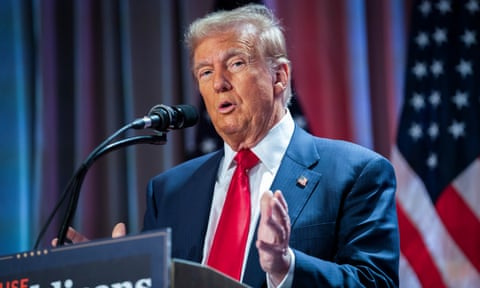
Donald Trump suffered a humiliating setback on Thursday when Republicans in Congress failed to pass a pared-down spending bill – just one day before a potential government shutdown that could disrupt Christmas travel.
By a vote of 174-235, the House of Representatives rejected the Trump-backed package, hastily assembled by Republican leaders after the president-elect and his billionaire ally Elon Musk scuttled a prior bipartisan deal.
Critics described the breakdown as an early glimpse of the chaos to come when Trump returns to the White House on 20 January. Musk’s intervention via a volley of tweets on his social media platform X was mocked by Democrats as the work of “President Musk”.

“The Musk-Johnson proposal is not serious,” Hakeem Jeffries, the House Democratic leader, told reporters. “It’s laughable. Extreme Maga Republicans are driving us to a government shutdown.”
Despite Trump’s support, 38 Republicans voted against the new package along with nearly every Democrat, ensuring that it failed to reach the two-thirds threshold needed for passage and leaving the next steps uncertain.
The defiance from within Trump’s own party caught many by surprise.
The latest bill would have extended government funding into March, when Trump will be in the White House and Republicans will control both chambers of Congress. It also would have provided $100bn in disaster relief and suspended the debt. Republicans dropped other elements that had been included in the original package, such as a pay raise for members of Congress and new rules for pharmacy benefit managers.

At Trump’s urging, the new version also would have suspended limits on the national debt for two years – a move that would make it easier to pass the dramatic tax cuts he has promised and set the stage for the federal government’s $36tn in debt to continue to climb.
Before the vote, Democrats and Republicans warned that the other party would be at fault if Congress allowed the government to shut down.
Mike Johnson, the Republican House speaker, told reporters that the package would avoid disruption, tie up loose ends and make it easier for Congress to cut spending by hundreds of billions of dollars when Trump takes office next year. “Government is too big, it does too many things, and it does few things well,” he said.
But Democrats dismissed the bill as a cover for a budget-busting tax cut that would largely benefit wealthy backers such as Musk, the world’s richest man, while saddling the country with trillions of dollars in additional debt.

Jeffries said during the floor debate: “How dare you lecture America about fiscal responsibility, ever?”
Jamie Raskin, a Democratic congressman, told reporters: “So who is our leader Hakeem Jeffries supposed to negotiate with? Is it Mike Johnson? Is he the speaker of the House. Or is it Donald Trump? Or is it Elon Musk? Or is it somebody else?”
Some Republicans objected that the bill would clear the way for more debt while failing to reduce spending. Congressman Chip Roy said: “I am absolutely sickened by the party that campaigns on fiscal responsibility.”
Even if the bill had passed the House, it would have faced long odds in the Senate, which is currently controlled by Democrats. The White House said Joe Biden opposed the package, adding: “Republicans are doing the bidding of their billionaire benefactors at the expense of hardworking Americans.”
Previous fights over the debt ceiling have spooked financial markets, as a US government default would send credit shocks around the world. The limit has been suspended under an agreement that technically expires on 1 January, although Congress likely will not have to tackle the issue before the spring.
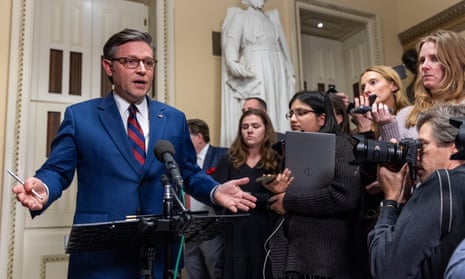
The unrest also threatens to topple Johnson, who was thrust unexpectedly into the speaker’s office last year after the party’s right flank voted out then speaker Kevin McCarthy over a government funding bill. Johnson has repeatedly had to turn to Democrats for help in passing legislation when he has been unable to deliver the votes from his own party. He tried the same manoeuvre on Thursday but fell short.
Several Republicans said they would not vote for Johnson as speaker when Congress returns in January, potentially setting up another tumultuous leadership battle in the weeks before Trump takes office.
Government funding is due to expire at midnight on Friday. If Congress fails to extend that deadline, the US government will begin a partial shutdown that would interrupt funding for everything from border enforcement to national parks and cut off pay cheques for more than 2 million federal workers.
The US Transportation Security Administration has warned that travellers during the busy holiday season could face long lines at airports.

US House passes funding proposal without Trump’s demand to raise debt limit
After Trump and Musk scuttled prior bipartisan deal, Republicans denied Trump-backed package
The US House of Representatives passed a funding proposal Friday evening just hours before the US government was due to shut down, with a bill that dropped Donald Trump’s demand for a debt limit increase.
The bill, which passed 366-34, approves government funding for three months and will be sent to the Senate, where it is expected to pass.
The vote came after the president-elect and his billionaire ally, Elon Musk, scuttled a prior bipartisan deal at the last minute, sparking conflicts within the Republican party.
The bill now on its way to the Senate temporarily funds federal operations at current levels and adds $100bn in disaster aid and $10bn in assistance to farmers.
The breakdown within the Republican party in the final days of the year offered a preview of the chaos that Trump is expected to bring when he returns to the White House on 20 January. A shutdown would have forced thousands of US government workers to be furloughed and could have disrupted holiday travel. The last federal shutdown happened in December 2018, in Trump’s first term.
The original bipartisan bill had been negotiated by House Republicans and Democrats, but was attacked on Wednesday by Musk, the world’s richest man, who spent more than a quarter of a billion dollars to elect Trump. Musk warned that any lawmaker who supported the “outrageous” spending bill “deserves to be voted out in 2 years!”
In response, the Republican speaker of the House, Mike Johnson, put forward a second version of the bill, a pared-down budget proposal that included a brand-new demand from Trump: a suspension of the debt ceiling. Trump had calculated that suspending limits on the national debt while Biden was still in office would save him a difficult fight in his first few months in the White House.
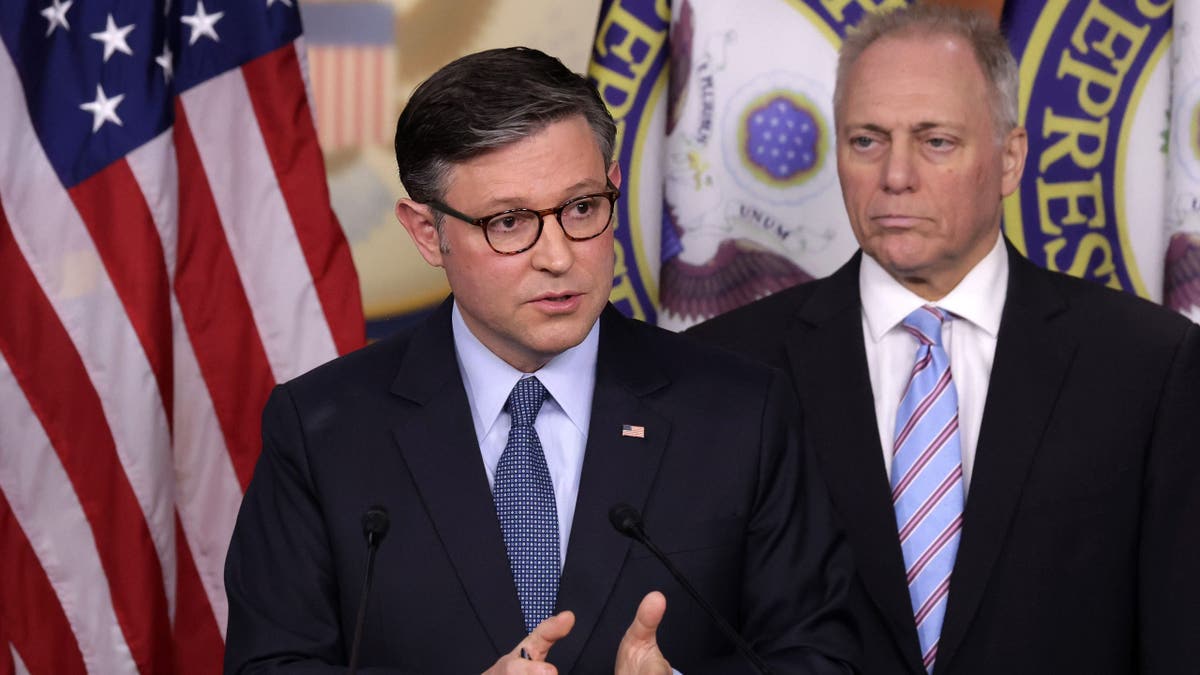
Democrats decried the new bill as a cover for a tax cut to benefit wealthy backers such as Musk, while creating trillions of dollars in additional debt for the US. Several Republicans also rebelled, outraged by the proposed lifting of government borrowing limits.
The bill failed by a vote of 174-235, a humiliating setback for Trump.
The political drama this week showed that Trump’s grip on the Republican party is not ironclad. The president-elect had furiously urged the package to be passed, including threatening to support primary opposition candidates of Republicans who opposed it.
Earlier on Friday, Karine Jean-Pierre, the White House press secretary, launched a blistering attack on Republicans for their handling of the budget crisis. “Republicans blew up this deal – they did – and they need to fix this, period,” she told reporters. “[Republicans need] to stop playing politics with a government shutdown, and … they’re doing the bidding of their billionaire friends, that’s what we’re seeing, at the expense of hardworking Americans.”
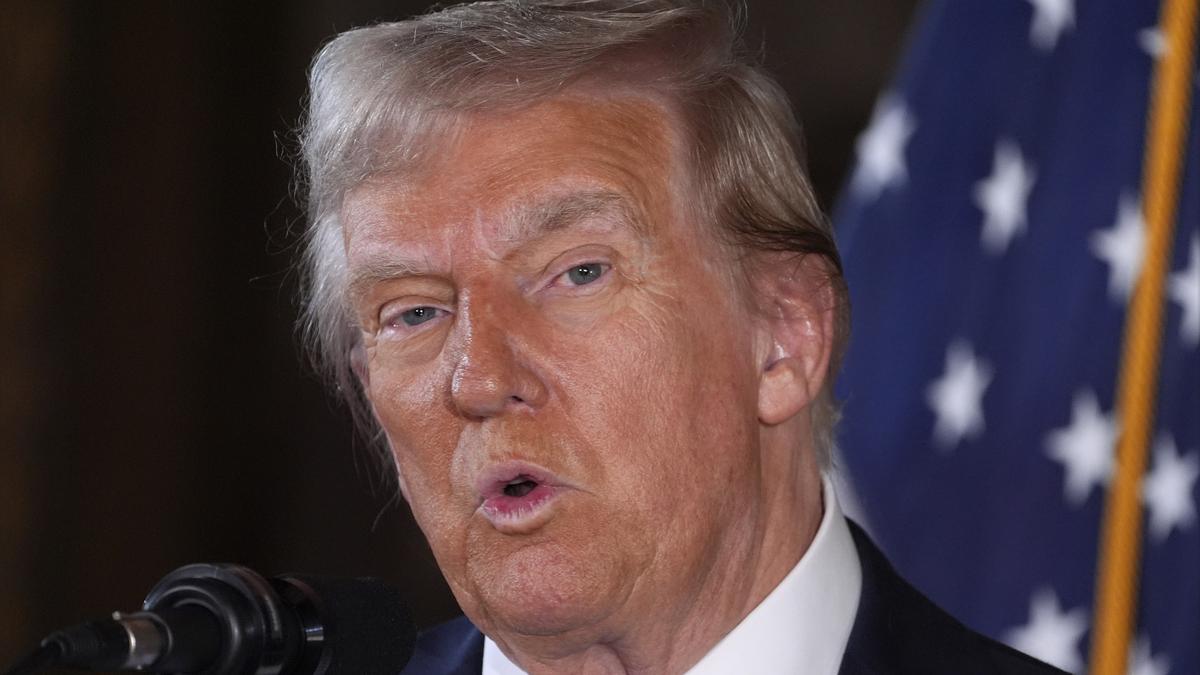
While Jean-Pierre didn’t name specific individuals, her comments appear to be referencing Musk and Vivek Ramaswamy.
Democrats mocked the influence of the tech billionaire this week, referring to the interventions of “President Musk”. In a speech on Friday, Rosa DeLauro, the top Democrat on the appropriations committee, decried the meddling of the “world’s richest man who no one voted for”, saying it was Musk’s fault that “Congress has been thrown into pandemonium”.
Musk repeatedly spread misinformation about the bipartisan proposal he helped kill, the AP found. He claimed the plan would have given lawmakers a 40% raise when the maximum possible increase through the proposal was actually 3.8%. Musk also shared a false post claiming the proposal would have given $3bn to a potential new NFL stadium in Washington DC; the bill had a provision to transfer the land of the Washington Commanders stadium from the US government to the District of Columbia, but explicitly stated there would be no associated federal funding.
Trump earlier on Friday repeated his demand for the suspension – or even elimination – of the federal borrowing limit and insisted any shutdown should happen under Joe Biden’s watch rather than his own upcoming administration.
Democratic senator Chuck Schumer, the majority leader, said Friday night that he was “confident” the final bill would pass the Senate. “Though this bill does not include everything Democrats fought for, there are major victories in this bill for American families … emergency aid for communities battered by natural disasters, no debt ceiling, and it will keep the government open with no draconian cuts,” he said in a statement.
Among the 38 Republicans who voted against the Trump-backed debt ceiling package on Thursday were several members of the conservative, pro-Trump Freedom caucus. The group included prominent conservatives like Andy Biggs, Paul Gosar, Chip Roy and Scott Perry, who have historically been strong Trump allies but are drawing a line at lifting government borrowing limits.
Kat Cammack, a Republican congresswoman who voted against the bill, told reporters that “this was not an easy vote for constitutional conservatives”
The Associated Press contributed to reporting

Here are the 34 Republicans that voted against the funding bill to avoid shutdown
More than 30 House Republicans voted against the government funding bill to avert a shutdown on Friday night.

The legislation cleared the lower chamber with a 366-34-1 vote, surpassing the two-thirds requirement needed as the Republican House leadership brought it up under the suspension of the rules process. Every member of the Democratic caucus, outside of Rep. Jasmine Crockett (Texas), who voted present, supported the modified funding package alongside 170 GOP lawmakers.
Here are the 34 Republican House members who voted against the continuing resolution to keep the government funded just hours before the midnight deadline:
Rep. Andy Biggs (R-Ariz.)
Rep. Dan Bishop (R-N.C.)
Rep. Lauren Boebert (R-Colo.)
Rep. Josh Brecheen (R-Okla.)
Sen.-elect and Rep. Jim Banks (R-Ind.)
Rep. Tim Burchett (R-Tenn.)
Rep. Eric Burlison (R-Mo.)
Rep. Michael Cloud (R-Texas)
Rep. Andrew Clyde (R-Ga.)
Rep. Eli Crane (R-Ariz.)
Rep. John Curtis (R-Utah)
Rep. Scott DesJarlais (R-Tenn.)
Rep. Russ Fulcher (R-Idaho)
Rep. Tony Gonzales (R-Texas)
Rep. Bob Good (R-Va.)
Rep. Lance Gooden (R-Texas)
Rep. Glenn Grothman (R-Wis.)
Rep. Andy Harris (R-Md.)
Rep. Diana Harshbarger (R-Tenn.)
Rep. Wesley Hunt (R-Texas)
Rep. Debbie Lesko (R-Ariz.)
Rep. Greg Lopez (R-Colo.)
Rep. Nancy Mace (R-S.C.)
Rep. Thomas Massie (R-Ky.)
Rep. Rich McCormick (R-Ga.)
Rep. Cory Mills (R-Fla.)
Rep. Alex Mooney (R-W.Va.)
Rep. Andy Ogles (R-Tenn.)
Rep. Scott Perry (R-Pa.)
Rep. Matt Rosendale (R-Mont.)
Rep. Chip Roy (R-Texas)
Rep. Keith Self (R-Texas)
Rep. Tom Tiffany (R-Wis.)
Rep. Beth Van Duyne (R-Texas)
Speaker Mike Johnson (R-La.) presented the bill just a few hours before members voted on it. The package would fund the government at current levels, designate billions for disaster relief and extend the farm bill for one year. The bill did not raise the debt limit, something President-elect Trump advocated for as the legislation was negotiated.
Johnson, whose speakership gavel has come into question in light of his handling of funding negotiations, touted the package as “America First’ legislation.”
“In January, we will make a sea change in Washington. President Trump will return to D.C. and to the White House, and we will have Republican control of the Senate and the House. Things are going to be very different around here,” Johnson said.
“This was a necessary step to bridge the gap, to put us into that, that moment where we can put our fingerprints on the final decisions on spending for 2025,” he added.
Trump and Johnson weigh the pros and cons of a shutdown
With the federal government mere hours away from a shutdown, the speaker and president-elect have been seriously contemplating whether it’s best to simply allow it to happen.

President-elect Donald Trump’s second administration has not even begun, and it is already staring down what could be its first make-or-break moment.
After the Trump-blessed continuing resolution and debt ceiling package failed yesterday with an embarrassingly high 38 House Republicans voting against the proposal, House Speaker Mike Johnson spent last night wracking his brain for a “Plan C” to fund the government before funding runs out at midnight tonight.
His challenge: Find a path that can keep Trump happy, placate House conservatives, win the support of a substantial number of House Democrats and pass muster with the Democratic-controlled Senate and White House — all while allowing Johnson to keep his gavel come January.
The conventional wisdom in Washington is that everybody wants to go home for the holidays, and that shutdowns are political losers.
But Johnson and Trump have been seriously contemplating whether it’s best to simply allow a shutdown to happen. We’re told that both men’s teams spent last night weighing what they view as the positives and negatives.
To be clear: Johnson’s crew was still trying to find a way out last night. We heard talk about a whole host of ideas, including passing a “clean” CR into January to buy a little time.
Still, it’s quite a turn from just a few months ago, when Johnson almost single-handedly talked Trump off the shutdown ledge. Back then, Johnson presented Trump with polling showing that Republicans in swing districts would pay the price politically — even using numbers from a Trump pollster to underline his point.
But this time is different, people close to Johnson tell POLITICO.
For one, it’s not right before an election — meaning any lawmakers who take hits from a prospective shutdown would have time to recover before campaign season, or so the thinking goes. Plus, some Republicans feel they have a mandate to govern and could potentially weather the storm better than previous shutdown fights.
Right or wrong, there also seems to be a belief among some people close to Trump that some sort of debt ceiling disaster is around the corner and thus this needs to be dealt with now.
Behind that thinking is a fear that Democrats are so eager to trip up Trump, that when the debt ceiling next needs to be raised, they’ll demand the GOP make politically impossible concessions. Republicans will then either cave to Democrats’ demands or they’ll cause a breach of the debt ceiling, precipitating an economic catastrophe in Trump’s first year back in office.
Under this logic, these Trump world figures argue that it’s better to face a shutdown now to try to resolve the issue. Trump himself heightened his demand early Friday morning: “Congress must get rid of, or extend out to, perhaps, 2029, the ridiculous Debt Ceiling. Without this, we should never make a deal.”

But that thinking runs head-on into the political reality of recent government shutdowns: The party that makes the demands not only pays politically, but never gets what they want.
Trump didn’t get a dollar for his wall during the 35-day shutdown in 2018-2019, and he paid a political price for it. Democrats didn’t get protections for Dreamers during the shutdown fight they stoked when Trump was in office, either.
So what makes Republicans think that, once in a shutdown, Democrats will give them what they want and that the GOP won’t get politically crushed?
Top Republicans like Vice President-elect JD Vance are already trying to message that Democrats will own this shutdown — if it happens. “They’ve asked for a shutdown and I think that’s exactly what they’re going to get,” Vance told reporters yesterday.
But Trump’s team knows it’ll be an uphill battle to convince the public that a shutdown is the Democrats’ fault. Trump picked the fight, and it was Trump — well, him and Elon Musk — who sank the bipartisan deal.
Start with that as the baseline, and then add in the political damage that follows: There will inevitably be headlines about the reality that government workers — and even members of the military — won’t get paid over Christmas. Blowback from the public seems inevitable.
There are political implications to that. Within Trump’s orbit, there is some worry that all of this could kneecap the president-elect’s polling numbers, which are at an all-time high.
There are policy implications, too: What would the logistical realities of a shutdown mean for Trump’s ambitious agenda? Remember his goal to pass a border bill in the first 30 days after the inauguration? Kiss that goodbye: Republicans will be too busy trying to squeeze Democrats on the debt ceiling.
Which brings us to a final point: Even if Trump manages to land a debt ceiling hike, a shutdown over this issue all but guarantees that his first big legislative achievement is going to be increasing the nation’s borrowing limit when we’re already more than $35 trillion in debt — not exactly a way to get Republicans excited.
But as Trump says, we’ll see what happens. People close to him say he wants a fight — and if that’s what he wants, Johnson just might give it to him.


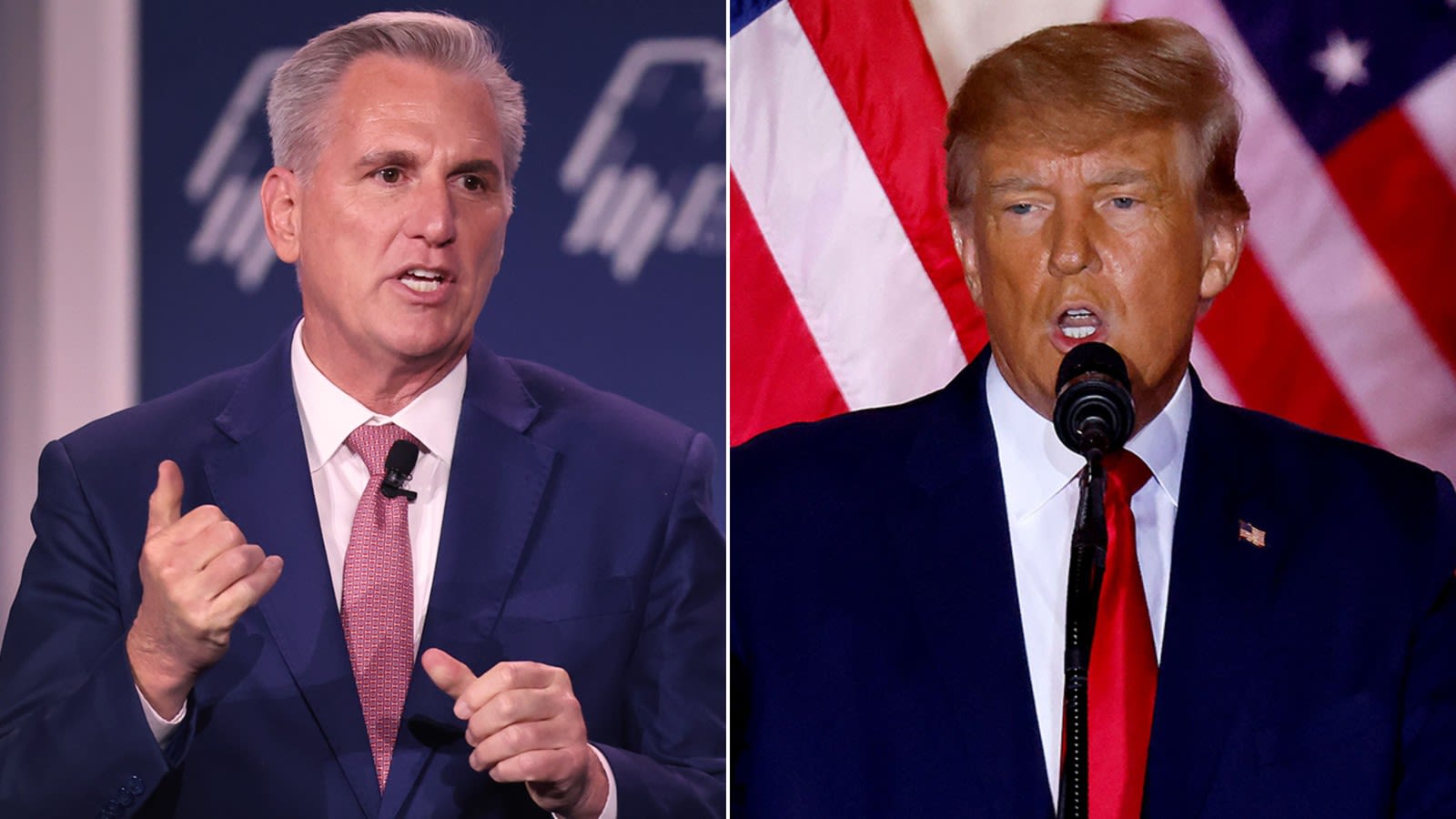







:max_bytes(150000):strip_icc():focal(624x0:626x2)/john-mccain-7dd4d3a525224e238f883e28d86bb19b.jpg?w=1200&resize=1200,0&ssl=1)




-1734609049428.jpg?w=1200&resize=1200,0&ssl=1)

















:max_bytes(150000):strip_icc():focal(754x379:756x381):format(webp)/chow-chow-bowling-green-subway-70ac9e829e20441a978d9f05a1085374.jpg?w=1200&resize=1200,0&ssl=1)
:max_bytes(150000):strip_icc():focal(725x300:727x302):format(webp)/Bridget-Garrison-dogs-tally-karma-01-021926-5f803803830d4771a5d48258b325f341.jpg?w=1200&resize=1200,0&ssl=1)


:max_bytes(150000):strip_icc():focal(749x0:751x2):format(webp)/Dog-missing-in-Colorados-mountains-for-43-days-reunited-with-owner-thanks-to-Summit-Lost-Pet-Rescue-022426-0ebb1d6502764f8eb20d846307727ad0.jpg?w=1200&resize=1200,0&ssl=1)
:max_bytes(150000):strip_icc():focal(743x471:745x473):format(webp)/Abandoned-Dog-at-Airport-022126-d755d65eb323443bade62469ed85c911.jpg?w=1200&resize=1200,0&ssl=1)
:max_bytes(150000):strip_icc():focal(749x0:751x2):format(webp)/rescued-dog-1-030226-b2d2c821a5d74691ba8edd4e8f76508d.jpg?w=1200&resize=1200,0&ssl=1)
:max_bytes(150000):strip_icc():focal(1211x776:1213x778):format(webp)/cats-rescued-22626-91b98a0bd7254a93a6bbf1a223dac5b0.jpg?w=1200&resize=1200,0&ssl=1)
:max_bytes(150000):strip_icc():focal(736x185:738x187):format(webp)/abandoned-puppies-01-021126-de716b3fef81415bb0669b390e8abddd.jpg?w=1200&resize=1200,0&ssl=1)
:max_bytes(150000):strip_icc():focal(749x0:751x2)/Irish-setter-gives-birth-to-record-17-puppies-030326-43c2927d84ed4a59880b16c2c8fdd530.jpg?w=1200&resize=1200,0&ssl=1)





:max_bytes(150000):strip_icc():focal(899x646:901x648)/Tatiana-Schlossberg-Jack-Schlossberg-030126-02-ffbc8841a935444d9a68bdeab3cfe504.jpg?w=1200&resize=1200,0&ssl=1)
